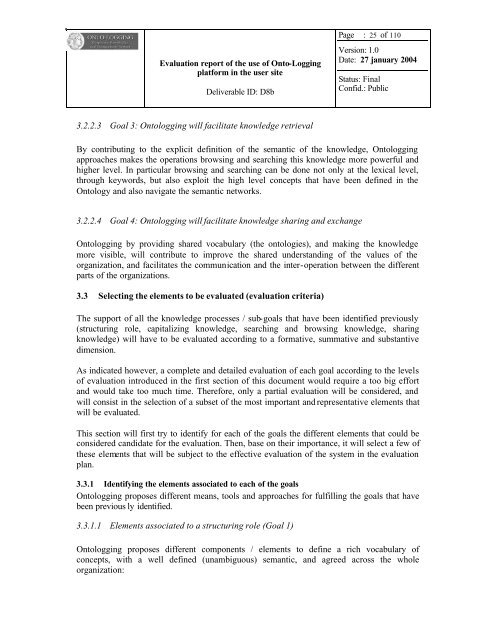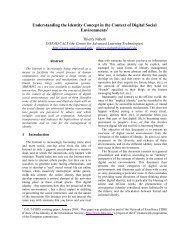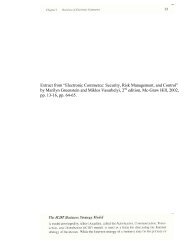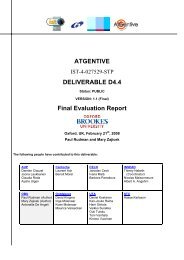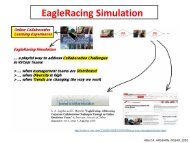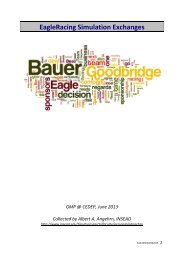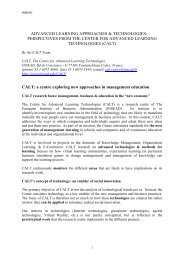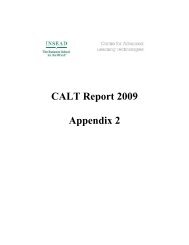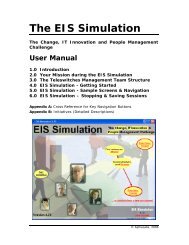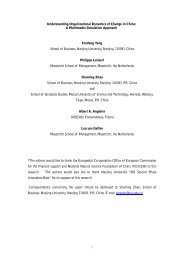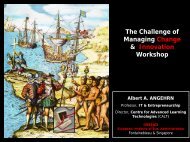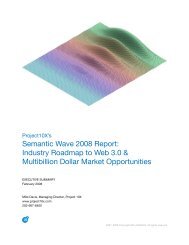pdf 820Kb - INSEAD CALT
pdf 820Kb - INSEAD CALT
pdf 820Kb - INSEAD CALT
Create successful ePaper yourself
Turn your PDF publications into a flip-book with our unique Google optimized e-Paper software.
Evaluation report of the use of Onto-Logging<br />
platform in the user site<br />
Deliverable ID: D8b<br />
3.2.2.3 Goal 3: Ontologging will facilitate knowledge retrieval<br />
Page : 25 of 110<br />
Version: 1.0<br />
Date: 27 january 2004<br />
Status: Final<br />
Confid.: Public<br />
By contributing to the explicit definition of the semantic of the knowledge, Ontologging<br />
approaches makes the operations browsing and searching this knowledge more powerful and<br />
higher level. In particular browsing and searching can be done not only at the lexical level,<br />
through keywords, but also exploit the high level concepts that have been defined in the<br />
Ontology and also navigate the semantic networks.<br />
3.2.2.4 Goal 4: Ontologging will facilitate knowledge sharing and exchange<br />
Ontologging by providing shared vocabulary (the ontologies), and making the knowledge<br />
more visible, will contribute to improve the shared understanding of the values of the<br />
organization, and facilitates the communication and the inter-operation between the different<br />
parts of the organizations.<br />
3.3 Selecting the elements to be evaluated (evaluation criteria)<br />
The support of all the knowledge processes / sub-goals that have been identified previously<br />
(structuring role, capitalizing knowledge, searching and browsing knowledge, sharing<br />
knowledge) will have to be evaluated according to a formative, summative and substantive<br />
dimension.<br />
As indicated however, a complete and detailed evaluation of each goal according to the levels<br />
of evaluation introduced in the first section of this document would require a too big effort<br />
and would take too much time. Therefore, only a partial evaluation will be considered, and<br />
will consist in the selection of a subset of the most important and representative elements that<br />
will be evaluated.<br />
This section will first try to identify for each of the goals the different elements that could be<br />
considered candidate for the evaluation. Then, base on their importance, it will select a few of<br />
these elements that will be subject to the effective evaluation of the system in the evaluation<br />
plan.<br />
3.3.1 Identifying the elements associated to each of the goals<br />
Ontologging proposes different means, tools and approaches for fulfilling the goals that have<br />
been previous ly identified.<br />
3.3.1.1 Elements associated to a structuring role (Goal 1)<br />
Ontologging proposes different components / elements to define a rich vocabulary of<br />
concepts, with a well defined (unambiguous) semantic, and agreed across the whole<br />
organization:


